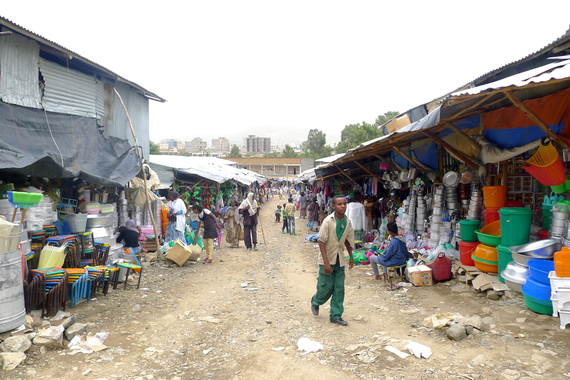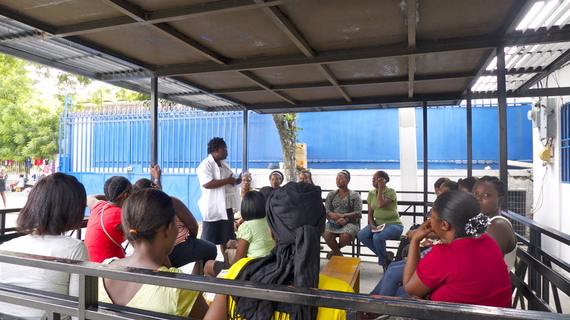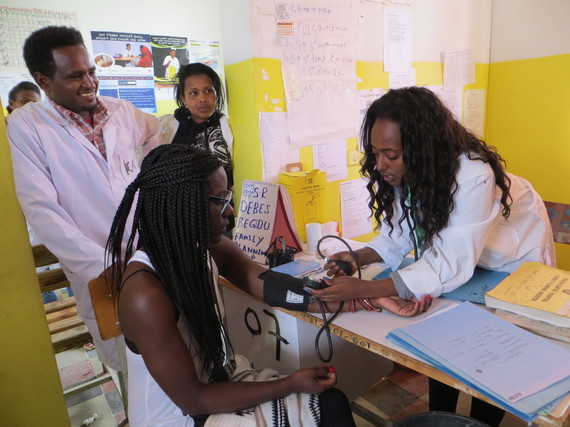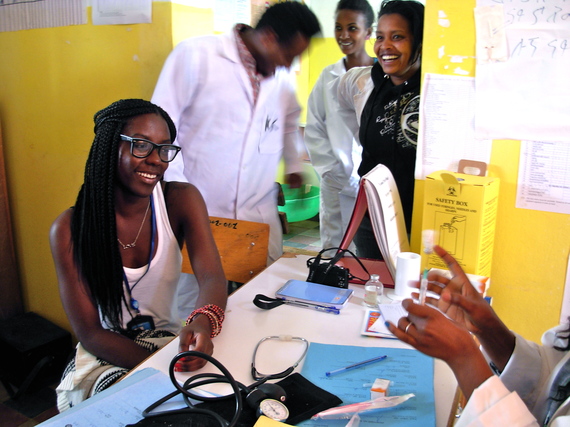Few can understand what it's like to look at a pregnancy test and see those two dark lines show up late one Friday night.
Few know what it feels like to react badly to contraceptive methods, ditching the pill only after a few years in favor of relief from side effects such as nausea, mood swings and even depression.
Few know what it's like to have the opportunity to plan ones life: to be in utter and total control over when you have a child, and just how many you have.
During my seven weeks on a media mission with the United Nations Population Fund (UNFPA), I visited over 30 healthcare centers and 10 hospitals across the world, meeting with countless women and men to talk about reproductive health and family planning. The mission was to asses the best practices, study the lessons learned since the International Conference on Population and Development (ICPD) and witness community based initiatives that were allowing young women the ability to take control of their health--and ultimately their lives.
In Haiti, I met trained healthcare providers who gave weekly family planning counseling sessions in the courtyard of a PROFAMIL clinic, in downtown Port au Prince. About 15 or so women gathered on the shaded veranda, listening intently as the provider described when and how to use the pill, how to put on a male condom, why the Depo shot was effective and what the side effects were when using IUD's.
In Sierra Leone I met midwives who traversed difficult road conditions often spending two to three hours on a crowded bus, before squeezing into a small speedboat to cross a bumpy river and deliver family planning services to women on the remote Turtle Islands.
The UNFPA mandate is very clear when it comes to reproductive health and family planning:
"every child is wanted, every birth is safe, every young person is free of HIV and every girl and woman is treated with dignity and respect."
It is a vision that not only speaks to me as a woman, but to many other women across the globe -- especially those living in impoverished communities.
Without access to basic reproductive healthcare, women fall victim to unwanted pregnancies, sexually transmitted diseases, Fistula, HIV AIDS, gender based violence and even maternal mortality.
There are over 20,000 girls under the age of 18 who give birth in developing countries everyday.
70,000 adolescent deaths also occur annually due to complications of pregnancy and childbirth.
When young women suffer unwanted pregnancies, their basic human rights are denied and their potentials go unfulfilled.
By receiving effective family planning counseling and having access to quality contraceptives, young people are better suited to fully participate in the development of their communities.
As the late, great Maya Angelou once said, "when you know better, you do better."
Over the last few weeks, I've spent a lot of time talking to family planning specialists about trends in contraceptive use; what methods women prefer, what couples discuss at counseling sessions and ultimately, how access to contraceptives is changing lives.
I found that in the Jacmel area of Haiti, women preferred the Implant -- it lasts up to three years and it's discreet. In Ngozi, Burundi, most women preferred the Depo shot, and because healthcare facilities were relatively central to the villages, women didn't mind returning after 3 months for a second, third or fourth shot.
Being a young woman myself, it's only natural that I feel a great affinity towards promoting the health and wellness of my peers. If there's one thing I've learned during this media mission with UNFPA, it's that education is key to promoting healthcare. If you educate a community about family planning and reproductive health, and if you have all the contraceptive methods available for them to use, they will choose to plan their lives.
By providing the financial support needed to bring commodities to rural areas or the training needed to boost the skills of midwives so that they can provide quality services, UNFPA is always focused on empowering women to take ownership of their lives by putting their health first.
Health and development go hand in hand, and as we reach the close of the Millennium Development Goals, it would be wise to assume that without a healthy, well informed population, a country will not have the human capital needed to build itself up efficiently.
When a young woman finds herself pregnant with no means of taking care of herself, she becomes yet another statistic of poverty. Most often than not, if she is of school age, the pregnancy forces her to cut short an education that would otherwise allow her to not only support herself, but to contribute to her local economy.
After critically thinking about what it meant to plan ones life and while at the Mulu Health Center in the Tigray region of Ethiopia, I decided that I could no longer advocate for something that I didn't already practice.
I've been on and off of birth control for several years now, recently having taken an eight-month break because I had no health insurance. In my 29 years of life, I have sustained an irregular monthly cycle, one cervical cancer scare and an unwanted pregnancy that resulted in termination.
I know that I want to be a mother one day -- a great one -- but I also want to develop the time and effort to secure moments where I can dedicate myself to a child. In all my conversations with close girlfriends, I often refer to myself as being "baby crazy" but not crazy enough to have a baby right now.
Being able to give a child everything they need and to raise them in an environment that is healthy for the both of us is very important to me.
This is, and continues to be the inspiration behind my passion for reproductive health and family planning. It is also the reason why I found myself discussing my contraceptive concerns with a healthcare provider at the Mulu Health Center as she escorted me to a nearby latrine. The healthcare provider assured me that there was no need to make an appointment -- here at Mulu, patients came in and got family planning counseling services on a "walk in" basis.
In addition, all family planning services and contraceptives were free.
With the incentives mounting high and a full range of choices available, I could find no better place to start planning for my family.
I received the same healthcare services as local women in the area: counseling, checking of vitals, necessary tests and finally, the Depo shot, a method I found to be most suitable given my situation.
It was a bit of an excitement for the health center.
Located in a very rural part of the Tigray region, it becomes rare that the center gets a chance to counsel and administer birth control to a foreigner.
About nine staff members entered the office to watch my procedure -- so lets just say that my entire health history and sex life was made public.
Immediately after my shot was administered, one of the male healthcare providers shouted, "Now you are ready to get an Ethiopian husband," to which an eruption of laughter filled the room.
If that is so, I have never felt better about my ability to choose wisely.




